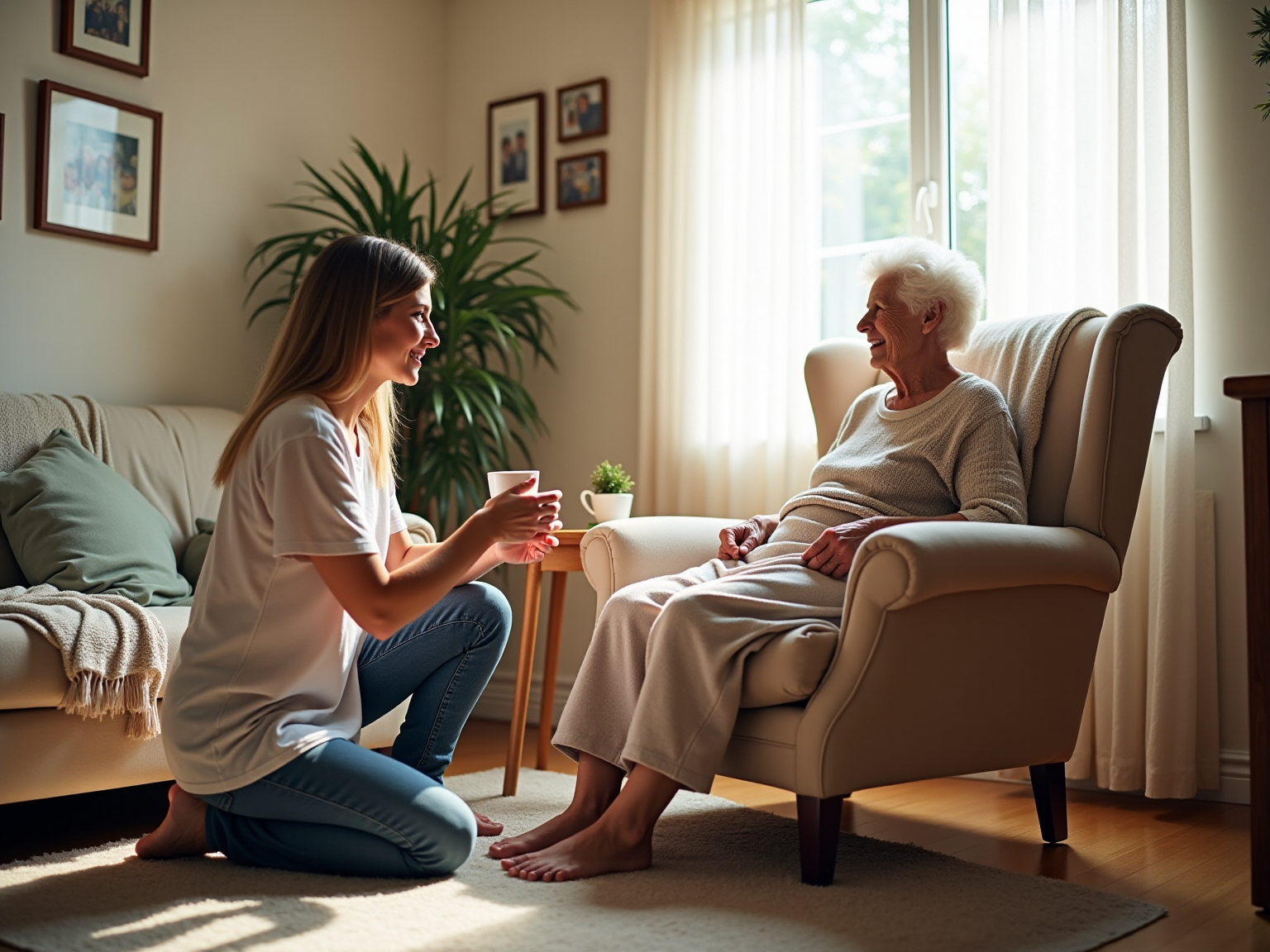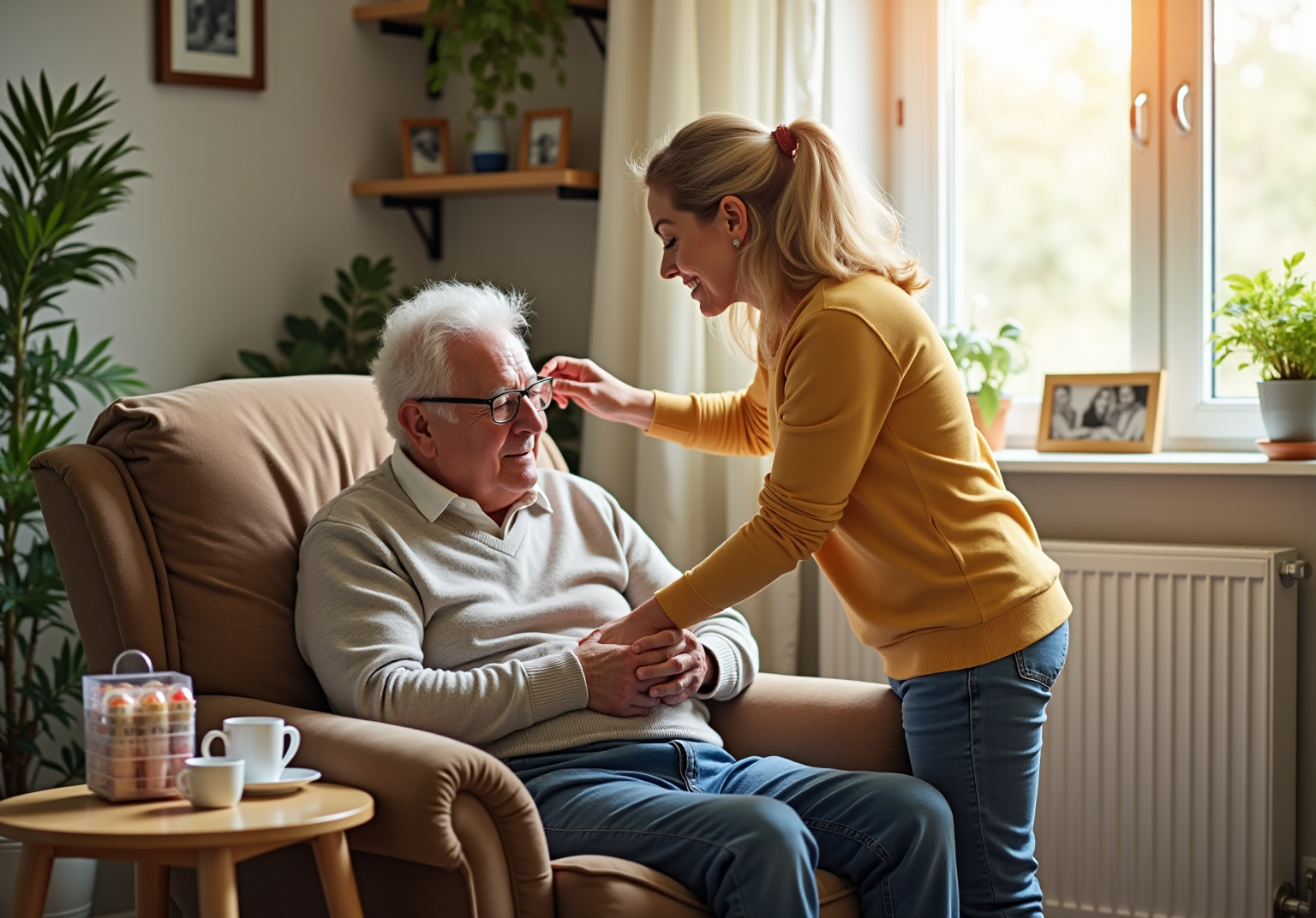Overview
Caring for seniors at home involves understanding their unique needs, providing emotional support, and ensuring a safe environment to enhance their quality of life. It’s essential to recognize the feelings and concerns that come with caregiving. Effective caregiving not only requires empathy, patience, and communication skills but also benefits from professional support services. These resources can help alleviate caregiver stress and promote the well-being of both caregivers and care recipients.
In addition, consider the impact of a supportive network. Connecting with others who share similar experiences can provide comfort and guidance. Remember, you’re not alone in this journey. Your dedication to providing care is commendable, and seeking help is a sign of strength.
As a result, reaching out for professional support can make a significant difference. Together, we can ensure that both you and your loved ones thrive in this caregiving experience. Your comfort and peace of mind are our priority, and we’re here for you every step of the way.
Introduction
In the realm of caregiving, the journey often begins at home, where the desire for independence meets the need for support. At-home caregiving serves as a lifeline for seniors facing age-related challenges, illness, or disabilities, allowing them to maintain dignity and comfort in familiar surroundings. As families navigate the complexities of balancing caregiving responsibilities with their personal lives, the demand for personalized care solutions continues to rise.
This article delves into the multifaceted world of at-home caregiving, exploring essential skills for effective family caregivers, strategies for creating a safe environment, and the critical role of technology and support networks. With insights from experts and case studies that highlight real-life impacts, readers will discover how to foster a nurturing atmosphere that enhances the quality of life for their loved ones. Remember, your comfort and well-being matter too, and we’re here to support you on this journey.
Understanding At-Home Caregiving: A Comprehensive Overview
At-home support encompasses a diverse array of services tailored for individuals who require assistance due to age, illness, or disability. This compassionate approach allows seniors to maintain their independence while receiving essential support in the comfort of their own homes. As we look toward 2025, recent trends indicate a growing demand for personalized support solutions that adapt to the unique needs of each individual, reflecting a shift towards more flexible assistance arrangements.
Family caregivers often find themselves balancing numerous responsibilities, including personal assistance, medication oversight, and emotional support. Understanding the extent and requirements of this support is crucial, as effective at-home assistance not only enhances the quality of life for seniors but also alleviates stress for families. Research shows that seniors receiving at-home assistance from Best Care Nurses Registry experience improved emotional well-being and a heightened sense of dignity, both vital for sustaining overall health.
Statistics reveal that nearly 90% of seniors prefer aging in their own homes, underscoring the importance of at-home support services in fulfilling this desire. Experts highlight the advantages of such care, with healthcare professionals noting that personalized support can significantly enhance a senior’s quality of life and independence. As Betty-Lou Kristy, a supporter of families, emphasizes, “Profound teaching moments that express the feelings behind events enable learners to experience how a situation feels,” underscoring the emotional support that is integral to caregiving.
Case studies illustrate the positive impact of at-home support on senior independence. For example, families who engaged professional caregivers from Best Care Nurses Registry reported a marked decrease in caregiver burnout and an increase in their loved ones’ participation in daily activities. This collaborative approach fosters a nurturing environment that not only promotes well-being but also empowers seniors to thrive in familiar surroundings.
Furthermore, research contributions from esteemed institutions in long-term support (LTC) highlight the importance of ongoing studies aimed at enhancing support practices.
Best Care Nurses Registry offers a comprehensive range of services, including:
- Personal assistance
- Companionship
- Medication management
- Specialized support tailored to individual needs
In summary, at-home caregiving is crucial for seniors, providing them with the necessary support to maintain their independence while allowing their families to focus on their personal lives. To learn more about how Best Care Nurses Registry can assist you or to schedule a consultation, please call (888) 203-2529.
With its extensive experience and strong reputation as a preferred choice for home health care services in South Florida since 1980, Best Care Nurses Registry remains committed to delivering high-quality, personalized care that meets the evolving needs of families and their loved ones.
Essential Skills and Qualities of Effective Family Caregivers
Effective family supporters embody key qualities such as empathy, patience, and strong communication skills. Empathy allows providers to connect emotionally with their loved ones, creating a supportive environment that is essential for enhancing quality of life. Patience is crucial when navigating the challenges of caregiving, particularly when managing difficult behaviors or health-related issues in seniors who may experience confusion or emotional distress.
Moreover, strong communication skills are vital for expressing needs, collaborating with healthcare professionals, and keeping family members informed about the assistance being provided.
In the realm of home health services, individuals trained as Certified Nursing Assistants (CNAs) or Home Health Aides (HHAs) can significantly enhance the support offered to seniors. CNAs typically undergo comprehensive training focused on medical tasks, such as taking vital signs and administering medications, while HHAs concentrate on personal assistance and daily living activities, including bathing, grooming, and meal preparation. This specialized training equips caregivers to address the unique needs of elderly individuals, supporting both their physical and emotional well-being.
Recognizing when a loved one may require additional support is also essential. Signs such as difficulty with daily tasks, social isolation, or safety concerns like frequent falls may indicate the need for companion or sitter services. These services can be tailored to meet the specific requirements and schedules of seniors, offering flexible options that range from a few hours a week to full-time assistance.
By involving loved ones in the selection process and gradually introducing these services, families can promote independence while ensuring safety and emotional support. Ultimately, the qualities of effective assistants, combined with the comprehensive and flexible services provided by Best Care Nurses Registry, foster a nurturing environment that enables seniors to thrive in the comfort of their own homes.
Are you ready to explore personalized support? Call now to get started with Best Care Nurses Registry at (888) 203-2529.
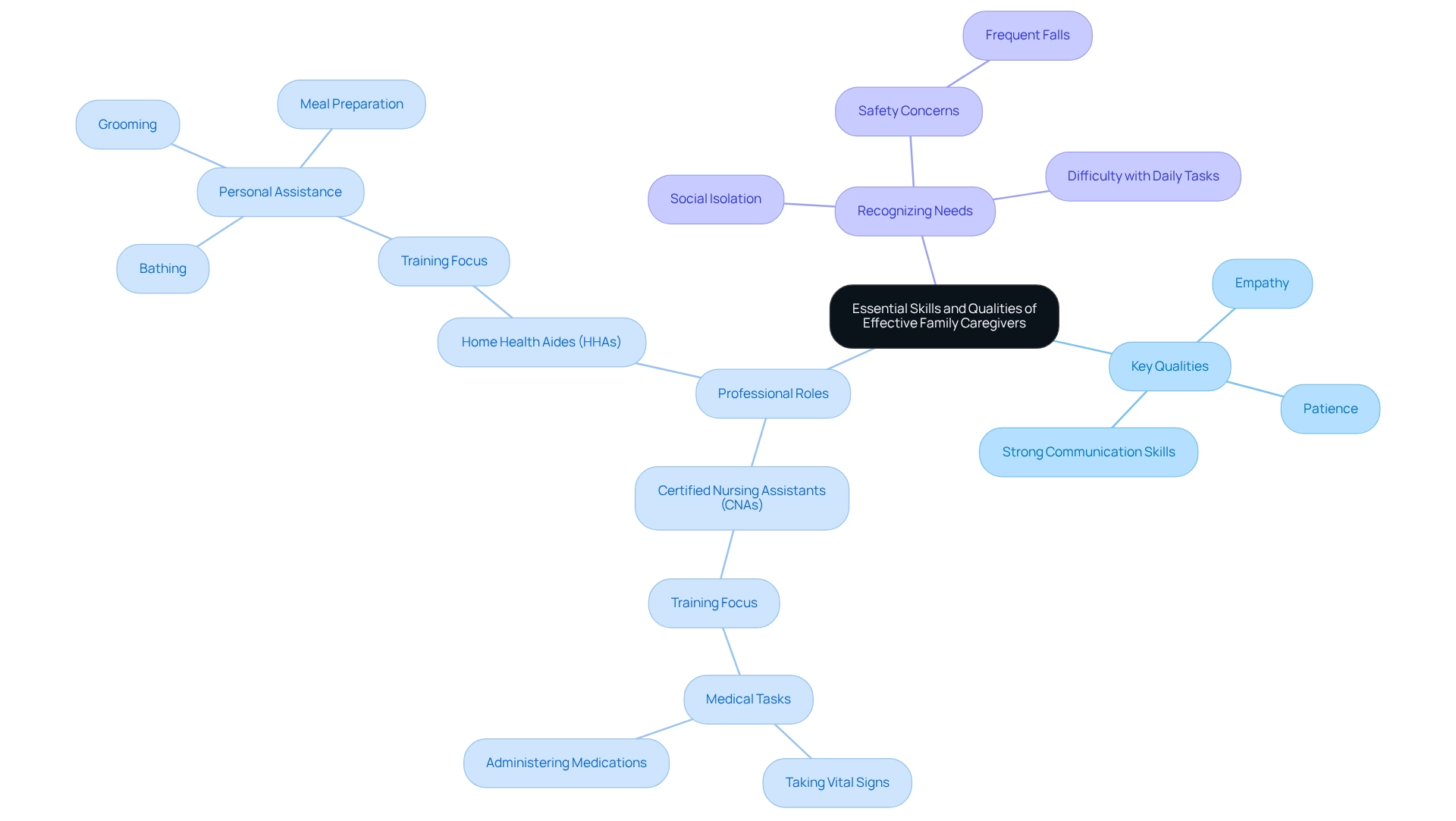
Creating a Safe and Supportive Home Environment for Seniors
Creating a secure and nurturing atmosphere for at-home caregiving is essential for enhancing the quality of support for seniors. First and foremost, ensure that there is ample illumination throughout the home, particularly in corridors and stairways, to prevent falls—this is crucial for those who may require CNA/HHA support services. Installing grab bars in bathrooms and using non-slip mats can significantly lower the risk of accidents, especially for individuals who may face challenges with personal hygiene or mobility.
Furthermore, decluttering living spaces and eliminating tripping hazards are vital steps in fostering a safer environment. It’s also important to evaluate whether your elderly loved one needs extra support at home, such as companion and sitter services. Key indicators to consider include difficulties with daily activities like dressing, cooking, or managing medications, along with health concerns that may necessitate ongoing care.
Consider incorporating technology, such as motion sensors and emergency response systems, to enhance safety and provide peace of mind for both caregivers and seniors. With Best Care Nurses Registry, you can feel reassured knowing that your loved one is safe and content in the care of experienced providers. Our customized support options for at-home caregiving ensure that your relative enjoys healthy, fulfilling days at home, allowing you to reconnect with your partner, children, and friends without the burden of support responsibilities.
Building Your Caregiving Team: Involving Family and Professionals
Creating an efficient support team for at-home caregiving requires a thoughtful strategy that includes family members, friends, and professional support providers. Start by assessing the strengths and availability of your loved ones who can assist with caregiving tasks. This evaluation provides clarity on who can help and in what capacity.
Open communication about roles and responsibilities is vital in at-home caregiving. It helps prevent misunderstandings and ensures that everyone is aligned in their efforts.
Integrating professional support from Best Care Nurses Registry or utilizing home health services can significantly enhance the quality of assistance, especially for specialized needs like skilled nursing or therapy. Our Private Duty RNs and LPNs not only provide medical care but also offer emotional support, ensuring that patients receive comprehensive attention in the comfort of their homes. This collaborative approach enriches the overall caregiving experience and meets the emotional support needs of family caregivers.
Studies reveal that 44% of individuals involved in at-home caregiving find the emotional aspects of their role challenging, underscoring the importance of a supportive network. Additionally, 79% of caregivers report receiving valuable information, support, or guidance from health professionals during their last health issue, highlighting the critical role of professional backing in the support process.
Engaging family members as essential partners in health services and at-home caregiving is crucial for long-term support. This partnership cultivates a sense of shared responsibility and can ease feelings of isolation and stress among family caregivers. Many caregivers express feeling unprepared for complex health-related tasks, such as medication management, which emphasizes the need for enhanced resources and training.
As Richard Schulz, a professor of psychiatry, points out, the emotional aspects of at-home caregiving can be overwhelming, highlighting the necessity for adequate support.
To connect with Best Care Nurses Registry for personalized home health care services, follow these simple steps:
- Call (888) 203-2529 to speak with our friendly staff about your needs and any questions you may have.
- We’ll discuss your situation with you or your loved one and seek a care plan from your doctor that perfectly caters to your needs.
- We will refer compassionate caregivers whom you choose to work with. A brighter future for your loved one and your household is just a phone call away.
By forming a caregiving team for at-home support that includes both family members and professionals from Best Care Nurses Registry, households can establish a more balanced and effective support system. This approach not only enhances the assistance provided to family members but also nurtures healthier relationships among all participants, ultimately leading to better outcomes for both providers and recipients of care. The case study titled “Caregiving and Health Services” illustrates the challenges family caregivers face in managing complex health tasks, further emphasizing the need for improved resources and training.
Additionally, our services are pet-friendly, ensuring that your loved ones can receive assistance in a comfortable environment that includes their furry companions.
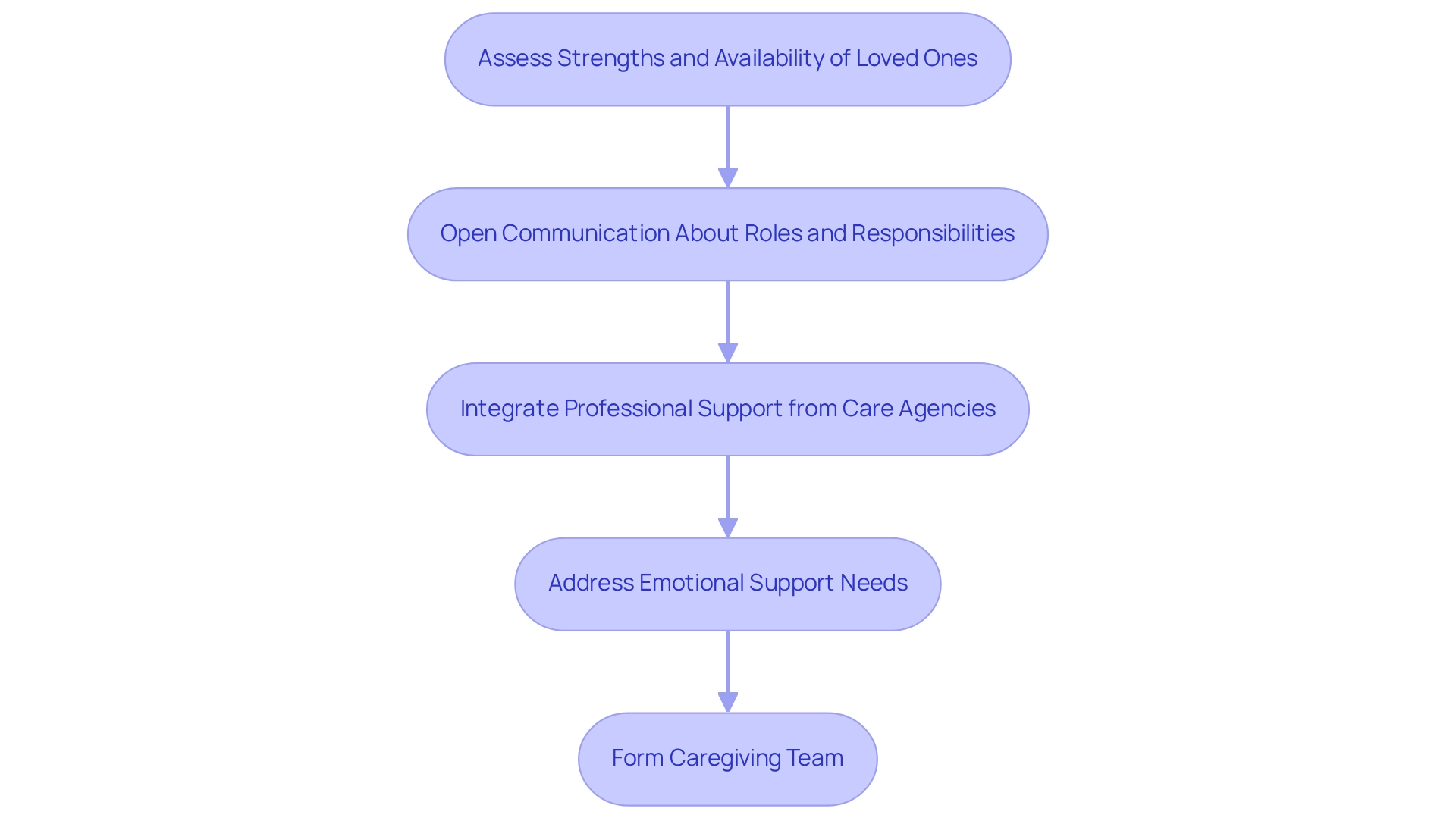
Effective Communication Strategies for Family Caregivers
Effective communication strategies for family supporters include active listening, clear expression of needs, and regular updates. Caregivers should practice active listening to truly understand the concerns and preferences of their loved ones, fostering an environment of trust and respect. Furthermore, engaging in open communication with healthcare professionals is essential. By sharing observations and concerns, caregivers can ensure thorough support for their family members.
Understanding the payment options available through Long Term Care insurance can significantly facilitate discussions about care needs. Best Care Nurses Registry accepts most Long Term Care insurances directly, allowing providers to focus on delivering support without the burden of upfront costs, unless an elimination period applies. To utilize Long Term Care insurance, support providers typically need to complete an Assignment of Benefits (AOB) form. This directs the insurance carrier to pay Best Care directly for services rendered, simplifying the process for everyone involved.
Regular family meetings can be invaluable in keeping everyone informed about the care plan and any changes in the care recipient’s condition. This collaborative approach to caregiving encourages open dialogue about how insurance can cover essential services like bathing, grooming, and companionship—services crucial for daily living but not typically covered by Medicare. It’s important to recognize that Medicare primarily focuses on skilled visits and does not offer support with activities of daily living, which private duty helpers are uniquely equipped to provide.
We’re here for you, and your comfort is our priority. By fostering a supportive network and understanding the resources available, we can ensure that your loved ones receive the compassionate care they deserve.
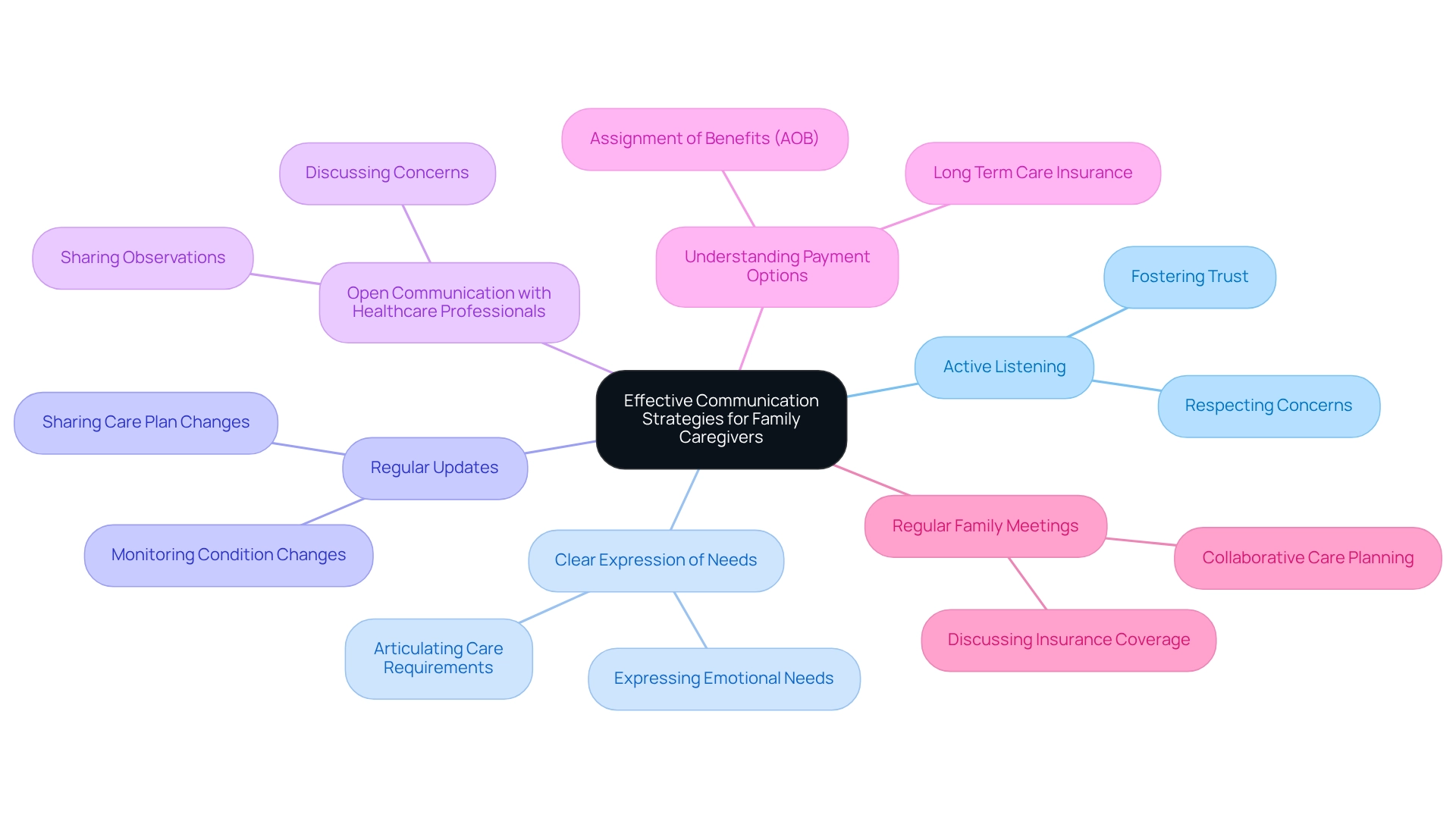
Managing Caregiver Stress: Tips for Self-Care and Resilience
Managing stress is crucial for those engaged in at-home caregiving, as it sustains both physical and emotional health. Caregivers, we encourage you to prioritize self-care by dedicating time to activities that foster relaxation and well-being. Engaging in regular exercise, pursuing hobbies, and maintaining social connections are essential practices for your overall health. Research shows that aiming for at least 30 minutes of exercise most days can significantly enhance your mood and reduce stress levels.
Establishing clear boundaries and expectations regarding your availability and duties is equally important. It’s essential to learn how to decline additional responsibilities that could lead to burnout. Participating in support groups or seeking professional counseling can provide meaningful avenues for sharing experiences and coping strategies, helping you feel less isolated in your caregiving role.
Incorporating mindfulness and stress-reduction techniques, such as deep breathing exercises or meditation, can further bolster your resilience and improve overall well-being. Case studies like ‘Self-Care Strategies for Support Providers’ and ‘Taking Care of Yourself: Tips for Support Providers‘ highlight that individuals who implement self-care strategies—such as maintaining a balanced diet, ensuring adequate sleep, and engaging in stress reduction practices—report better health outcomes and increased effectiveness in their roles.
The emotional toll of caregiving can be profound. Studies indicate that loneliness and social isolation can increase the risk of premature death by 26% and 29%, respectively, according to the U.S. Surgeon General. Thus, it’s vital to acknowledge the significance of your own health and well-being, as taking care of yourself enhances your ability to assist others effectively.
By prioritizing self-care, you can mitigate stress and foster a healthier, more balanced approach to your caregiving responsibilities. Remember, your comfort and well-being are our priority, and we’re here for you.
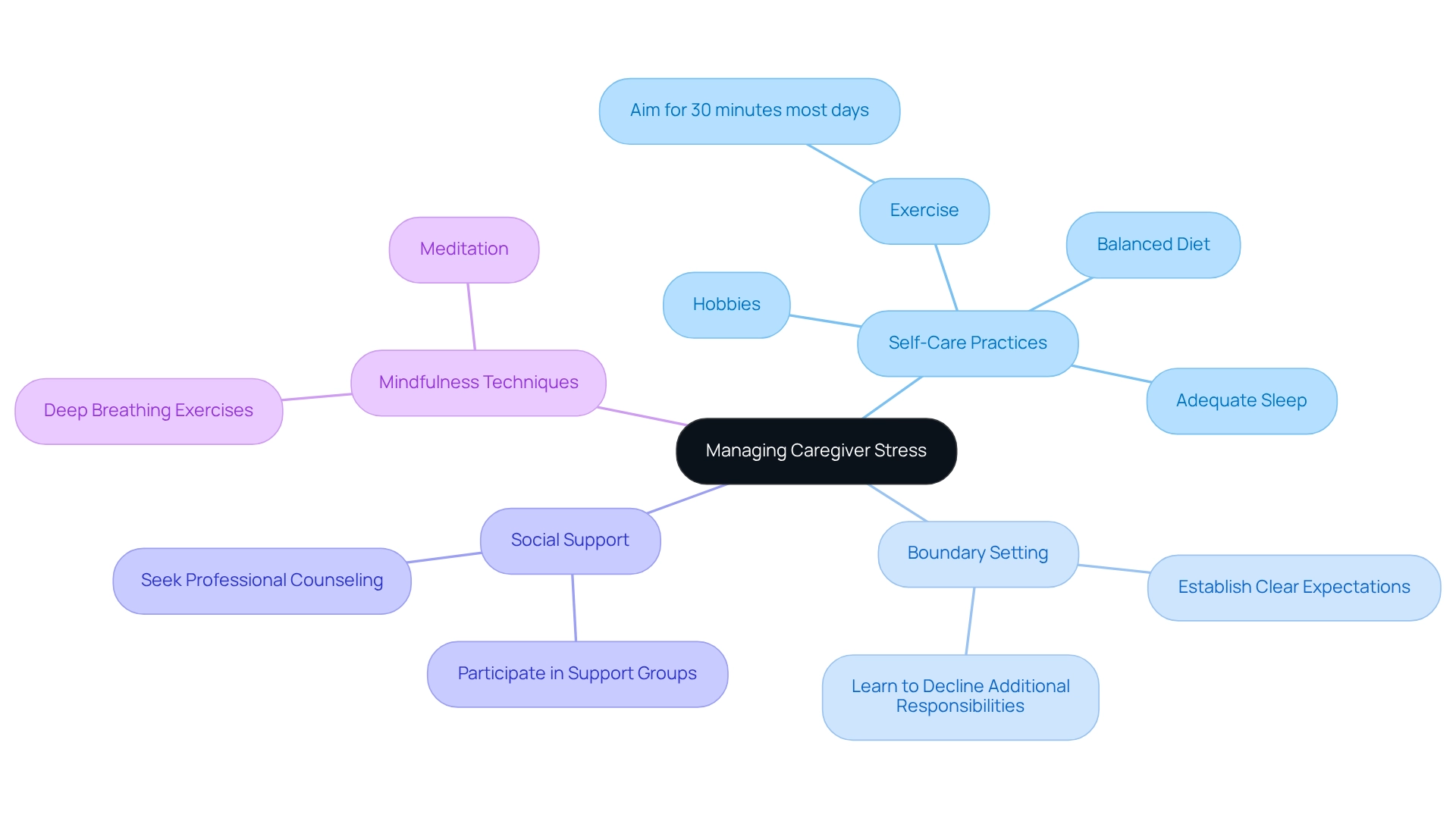
Navigating the Financial Aspects of At-Home Caregiving
Managing the financial aspects of at-home caregiving can feel overwhelming, but understanding the expenses involved and exploring available resources can make a significant difference. We encourage families to create a detailed budget that encompasses all support expenses, including:
- Medical supplies
- Home modifications
- Potential caregiver wages
Exploring long-term support insurance options can provide much-needed financial assistance for at-home caregiving services, especially with the expertise offered by Best Care Nurses Registry, which has decades of experience in this field.
In addition, many households may qualify for government assistance programs or tax credits designed to alleviate the financial burden of at-home caregiving. The Best Care Concierge Program enhances this journey by connecting families with a network of trusted professionals, including financial advisors who specialize in elder care. This ensures that individuals receive comprehensive support for both legal and financial matters. With direct access to a Registered Nurse owner and flexible, responsive support, consulting with these experts can empower families to make informed and effective choices about managing costs.
Your comfort and peace of mind are our priorities, and we’re here for you every step of the way. Together, we can navigate the complexities of caregiving with compassion and understanding.
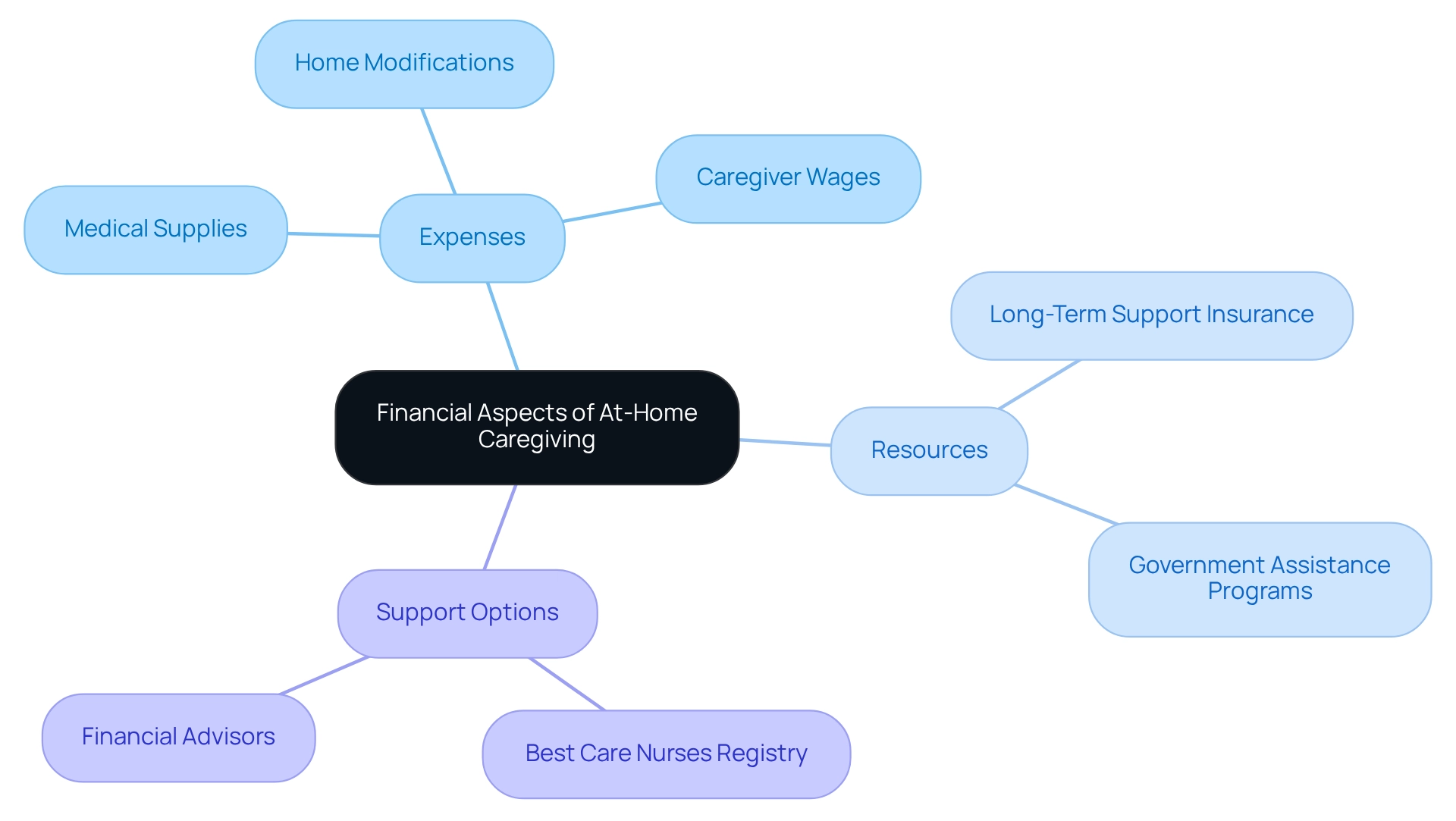
Leveraging Technology: Tools and Resources for Family Caregivers
Incorporating technology into support roles can greatly enhance the overall experience for family members assisting, especially when paired with tailored help from Best Care Nurses Registry. A variety of tools and resources are now available, including:
- Medication management apps
- Scheduling software
- Telehealth services
All designed to streamline caregiving tasks. These technologies empower assistants to efficiently monitor medications, manage appointments, and arrange daily tasks, significantly reducing the risk of mistakes and improving overall organization.
Best Care Nurses Registry understands the challenges that family supporters face, from the ongoing concern for their loved one’s safety to the overwhelming duties that can lead to stress and exhaustion. Feelings of guilt and anxiety can weigh heavily on those providing care, making it essential to seek assistance. By obtaining a personalized support plan from your physician and connecting with experienced assistants, we ensure that your loved one is secure and content at home.
This support allows you to reconnect with your spouse, children, and friends, and catch up on responsibilities that may have been neglected. Call now to get started at (888) 203-2529.
Telehealth services have proven particularly beneficial, especially during the COVID-19 pandemic. A study examining data from over 33,100 Medicare patients with chronic conditions revealed that those utilizing high levels of telehealth experienced significant improvements in service continuity. This was especially true for patients with various chronic conditions, underscoring the effectiveness of remote consultations in ensuring consistent support.
The study highlights the importance of telehealth in managing chronic diseases such as cardiovascular diseases and diabetes, which are prevalent among seniors.
Furthermore, communication platforms like video calls enable regular check-ins with healthcare providers and family members, ensuring that everyone involved in the support process remains informed and engaged. This connectivity not only enhances the quality of support but also fosters a nurturing community among providers, alleviating feelings of isolation. As Erica Coe pointed out, ’56 percent of counties in the United States are without a psychiatrist, 64 percent of counties have a shortage of mental health providers, and 70 percent of counties lack a child psychiatrist,’ emphasizing the critical role telehealth plays in addressing these disparities in support.
As of 2025, the latest technological tools for relatives providing care include advanced medication management applications that offer reminders and tracking features, essential for ensuring adherence to prescribed regimens. Statistics indicate that a significant portion of family supporters are now utilizing these technologies, reflecting a growing trend towards digital solutions in home assistance. For instance, Third Eye Health successfully treated patients in skilled nursing facilities at an overall rate of 91% from March to July 2020, demonstrating the effectiveness of telehealth services in improving patient outcomes.
By embracing these technological advancements alongside the personalized support from Best Care Nurses Registry, individuals can not only streamline their daily tasks but also enhance the quality of assistance provided to their loved ones, ultimately leading to better health outcomes and improved peace of mind.
Key Takeaways and Resources for Family Caregivers
Effective at-home caregiving requires a deep understanding of the responsibilities involved, essential skills, and the importance of a supportive environment. Family supporters should prioritize self-care, as 44 percent report that providing care can be emotionally challenging. This highlights the necessity for personal well-being alongside care responsibilities.
Effective communication plays a crucial role, enabling caregivers to express their needs and concerns clearly. This fosters stronger relationships with care recipients and healthcare providers, creating a more supportive atmosphere.
Establishing a strong support network is vital for resilience among caregivers. Participating in local support groups and online forums can provide emotional support and practical guidance. Educational resources tailored for caregivers can also enhance their skills and boost their confidence.
For instance, a recent initiative created a digital support platform for individuals affected by early-onset Alzheimer’s. This resulted in a user-friendly website that achieved a 95% satisfaction rate among its visitors, underscoring the significance of resources that cater specifically to caregivers’ needs.
As Kate Galvin, CEO, observes, ‘Balancing the joy and challenge of personal and caregiving responsibilities along with a meaningful and engaging career is recognized.’ This statement emphasizes the importance of acknowledging the dual roles many support providers take on. Additionally, family supporters often play a crucial but overlooked role during the discharge process from hospitals or skilled nursing facilities, assisting with health system interactions and appointments.
Furthermore, exploring technology solutions can significantly enhance the caregiving experience. Tools that improve communication with healthcare systems and manage appointments can alleviate some of the burdens caregivers face. State programs designed to support caregivers vary, offering resources such as direct payments and training funding, which can be invaluable for family providers.
At Best Care Nurses Registry, we understand the complexities of providing assistance and offer customized home health services. Our adaptable respite support is designed to aid both caregivers and individuals of all ages. We also accept most long-term support insurances directly, simplifying the payment process for our clients. Most carriers require a form called an Assignment of Benefits (AOB) to be completed by the policyholder, allowing us to direct the carrier to pay Best Care directly.
Our empathetic support matching procedure ensures you receive tailored assistance that meets your individual needs, including help with daily activities such as bathing, grooming, and meal preparation.
As caregiving roles evolve, it is essential for those involved in at-home caregiving to seek help and utilize available resources. This ensures they can provide the best support for their loved ones while also taking care of their own well-being. By leveraging these strategies and resources, family caregivers can navigate their responsibilities more effectively and enhance their overall caregiving experience. For personalized care consultations, please call (888) 203-2529 to speak with our friendly staff and discuss your needs.
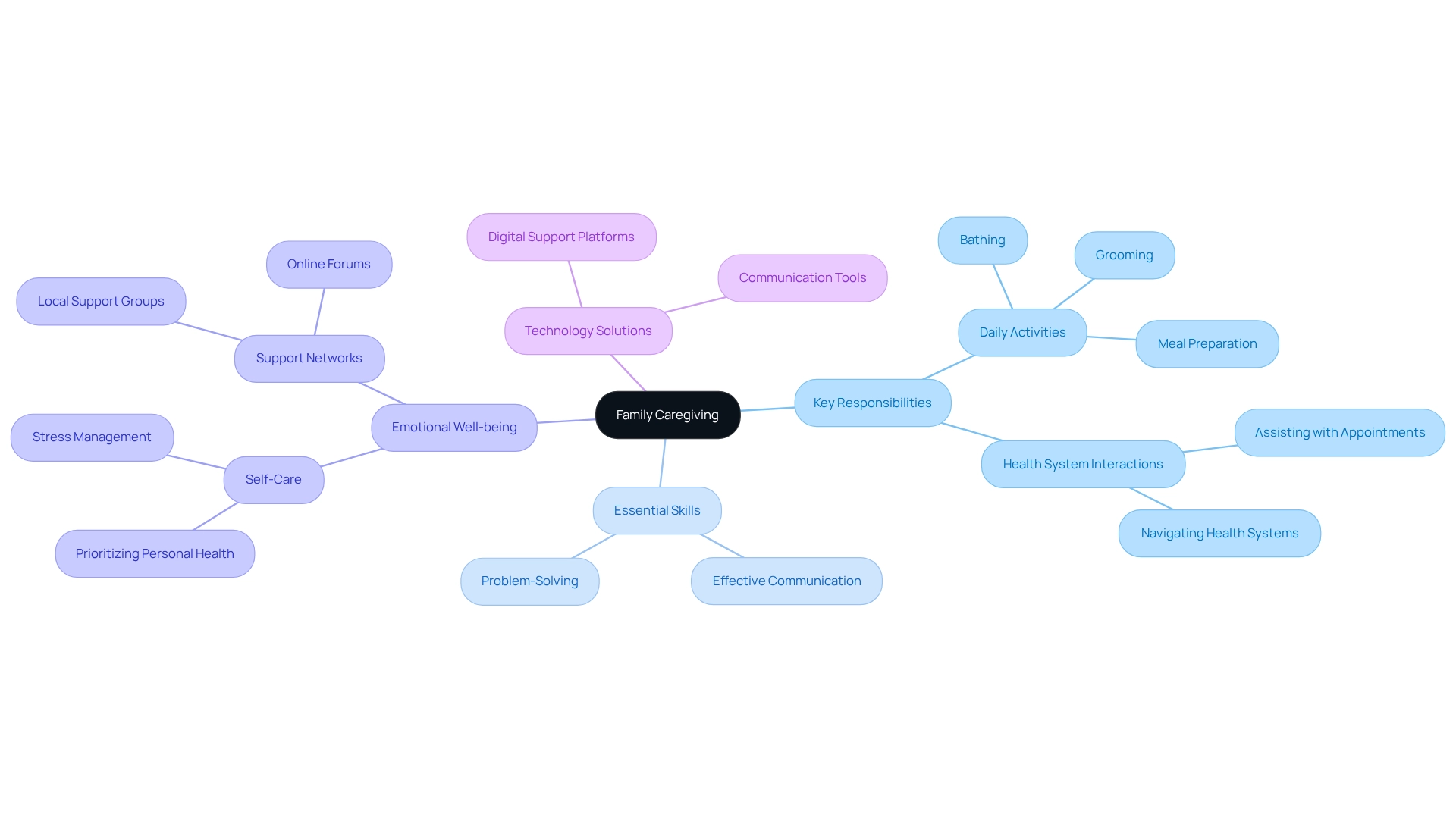
Conclusion
At-home caregiving is vital for empowering seniors to maintain their independence while receiving essential support in the comfort of familiar surroundings. This compassionate approach blends practical assistance with emotional engagement, significantly elevating the quality of life for older adults.
Creating a safe home environment is paramount. It involves thoughtful modifications that minimize risks and enhance comfort. A collaborative caregiving team, consisting of family members and professional caregivers, ensures comprehensive care tailored to each individual’s unique needs. Effective communication, paired with modern technology, streamlines caregiving tasks, enriching the overall experience.
Equally important is managing caregiver stress, which is crucial for sustaining health and effectiveness. By prioritizing self-care and utilizing available resources, caregivers can better cope with the emotional demands of their roles. Understanding the financial aspects, including long-term care insurance and community support programs, can also help alleviate some burdens.
Ultimately, effective at-home caregiving fosters a nurturing atmosphere that empowers seniors to flourish. By employing the right strategies and support systems, caregivers can enhance their own well-being while significantly improving the lives of their loved ones. Engaging with a trusted provider like Best Care Nurses Registry is a crucial step towards ensuring quality care and a brighter future for families. We’re here for you, ready to support you on this journey.
Frequently Asked Questions
What is at-home support?
At-home support refers to a variety of services designed for individuals needing assistance due to age, illness, or disability, allowing seniors to maintain their independence while receiving help in their own homes.
Why is there a growing demand for personalized support solutions?
There is an increasing demand for personalized support solutions that adapt to the unique needs of each individual, reflecting a shift towards more flexible assistance arrangements as we approach 2025.
How does at-home support affect family caregivers?
Family caregivers often juggle multiple responsibilities, including personal assistance and medication oversight. Effective at-home support enhances seniors’ quality of life and reduces stress for families.
What benefits do seniors experience from at-home assistance?
Seniors receiving at-home assistance report improved emotional well-being and a greater sense of dignity, which are crucial for overall health.
What percentage of seniors prefer to age at home?
Nearly 90% of seniors prefer aging in their own homes, highlighting the importance of at-home support services.
What services does Best Care Nurses Registry offer?
Best Care Nurses Registry offers a range of services including personal assistance, companionship, medication management, and specialized support tailored to individual needs.
What qualities should effective family supporters possess?
Effective family supporters should have empathy, patience, and strong communication skills to create a supportive environment and navigate caregiving challenges.
What training do Certified Nursing Assistants (CNAs) and Home Health Aides (HHAs) receive?
CNAs receive training focused on medical tasks like taking vital signs and administering medications, while HHAs focus on personal assistance and daily living activities, such as bathing and meal preparation.
How can families recognize when a loved one needs additional support?
Signs that may indicate the need for additional support include difficulty with daily tasks, social isolation, and safety concerns such as frequent falls.
How can families promote independence while ensuring safety for seniors?
Families can promote independence by involving loved ones in selecting support services and gradually introducing these services to ensure safety and emotional support.
What steps can be taken to create a safer home environment for seniors?
To enhance safety, ensure proper lighting, install grab bars, use non-slip mats, declutter living spaces, and incorporate technology like motion sensors and emergency response systems.
How can I learn more about the services provided by Best Care Nurses Registry?
To learn more about the services offered or to schedule a consultation, you can call Best Care Nurses Registry at (888) 203-2529.

